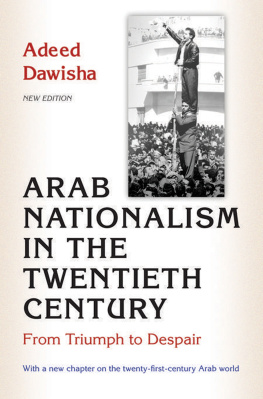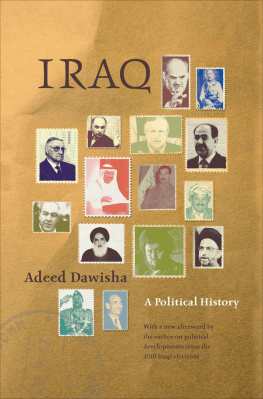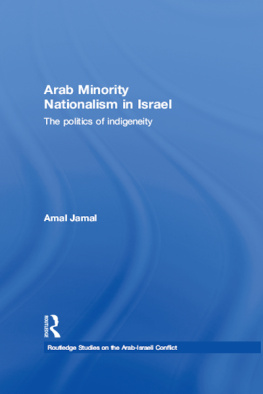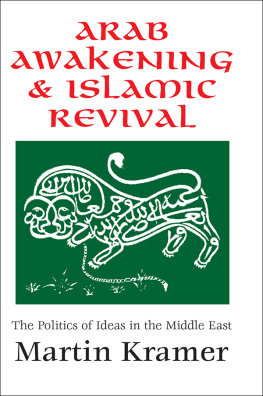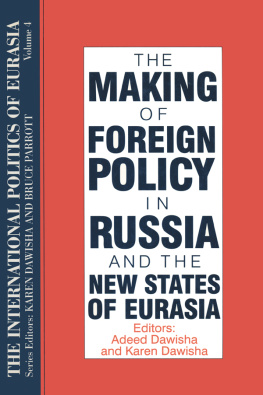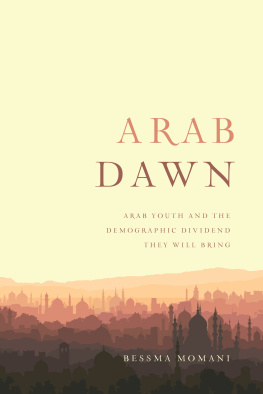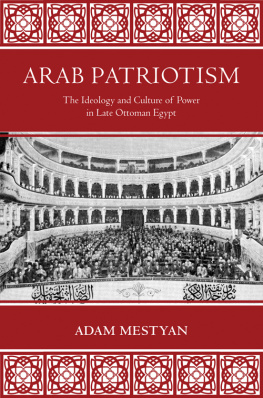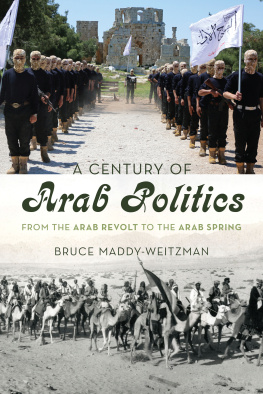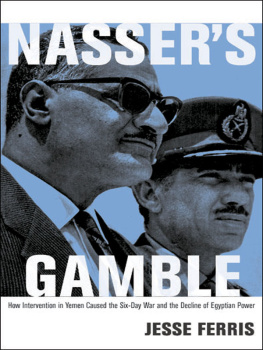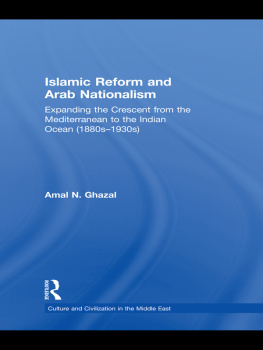
ARAB NATIONALISM
IN THE TWENTIETH CENTURY
ARAB NATIONALISM
IN THE TWENTIETH CENTURY
From Triumph to Despair
New Edition
ADEED DAWISHA
PRINCETON UNIVERSITY PRESS
PRINCETON AND OXFORD
Copyright 2003 by Princeton University Press
New chapter, Copyright 2016 by Princeton University Press
Published by Princeton University Press, 41 William Street, Princeton, New Jersey 08540
In the United Kingdom: Princeton University Press, 6 Oxford Street, Woodstock, Oxfordshire OX20 1TR
All Rights Reserved
Third printing, and first paperback printing, 2005
First new edition printing, with a new chapter by the author, 2016
Paperback ISBN: 978-0-691-16915-6
Library of Congress Control Number: 2015959388
This book has been composed in Sabon and Futura Book
Printed on acid-free paper.
press.princeton.edu
Printed in the United States of America
10 9 8 7 6 5 4 3 2 1
Contents
ARAB NATIONALISM
IN THE TWENTIETH CENTURY
CHAPTER ONE
DEFINING ARAB NATIONALISM
T he men and women of the nationalist generation who had sought the political unity of the Arab people must have cast weary eyes at one another when they heard their acknowledged leader call a truce with those they considered to be anti-unionists; they must have dropped their heads and thrown their hands in the air when he announced the onset of a new era where solidarity among Arab states would replace the quest for a comprehensive political unity. Had Gamal Abd al-Nasir, the President of Egypt and the hero of Arab nationalism, reneged on the principles of the Arab nationalist creed when in 1963 he declared that it was Arab solidarity which constituted the firm basis upon which Arab nationalism could be built,path of revolutionary Arab nationalism with its unequivocal commitment to organic Arab unity.
But their heros intent was different, more complex, and more subtle. Nasir, after all, was both an ideologue and a politician. To him the path to Arab unity was fraught with both opportunities and constraints, and an organic unity of all the Arabs in one unified state would be the ultimate aim of a long and dialectical process consisting of several stages.
To this, Sati al-Husri, who, as we shall see later, was the foremost theoretician of Arab nationalism, would say, Amen. Throughout his numerous writings on Arab nationalism, Husri never lost sight of the ultimate goal of the ideology he so vigorously propagated, namely the political unity of the Arabic-speaking people. People who spoke a unitary language, Husri maintained, have one heart and a common soul. As such, they constitute one nation, and so they have to have a unified state. The conclusion is unambiguous: To avoid losing future wars, the Arabs had to unite into one Arab state.
The founders of the Bath Party, the prominent Arab nationalist organization, felt the same about the connection between nationalism and organic political unity. The opening article of the party constitution promulgated in 1947 unequivocally declares: The Arabs form one nation. This nation has the natural right to live in a single state. [As such] the Arab Fatherland constitutes an indivisible political and economic unity. No Arab country can live apart from the others. To Aflaq, therefore, Arab unity is not only an intrinsic element of Arab nationalism; it is also a necessary precondition for the revival of the Arab spirit and Arab intellect.
As the membership of the party grew in the years to follow, and as its ideas spread throughout the Arab world, members would squabble over the meaning and role of such fundamental Bathist principles as freedom, socialism, and religion. Yet not until the eclipse of the Arab nationalist idea itself was there ever any questioning of unity as an absolutely essential component of the partys Arab nationalist doctrine. or through the writings of Sati al-Husri, it was inexorably linked to Arab political unity. In short, to the thinkers and activists who made up the nationalist generation, Arab nationalism would be a hollow and meaningless concept if it did not strive to gather its children under one roof in one unified and sovereign Arab state. And it is this definition of Arab nationalism, with its necessary goal of Arab political unity, that will be used in this study.
But why this detailed and deliberate emphasis on the seemingly abiding link between Arab nationalism and Arab political unity? Can this link be anything other than self-evident? Well, not necessarily. In fact, an ongoing debate among specialists on Arab and Middle Eastern politics over the nature of nationalism has centered on whether achieving or desiring statehood was by necessity a core element of nationalism. Hence, the argument has predicated on whether the concept of nationalism is one of culture or one of politics. Anderson defines the nation as an imagined community:
It is imagined because the members of even the smallest nation will never know most of their fellow members, meet them, or even hear of them, yet in the minds of each lives the image of their communion. [It] is imagined as a community, because regardless of the actual inequality and exploitation that may prevail in each, the nation is always conceived as a deep, horizontal comradeship.
Using this definition and relying on another assertion by Anderson that nationness and nationalism are cultural artifacts of a particular kind, Smith concludes that Anderson cannot be more adamant in postulating a statal referent to nationalism.
Gershoni and Jankowski are undoubtedly right in arguing that historically the absence of a state has not been a barrier to nationalist imaginings. They point to the many groups, Palestinians, Basques, Kurds, etc., that have existed and continue to exist that claim to be a nation even though they lack a state, and they further argue that to insist on positing the state as the essential criterion for nationalism would deny these groups their claims for nationhood. And it is perhaps in this context, in the need for a sovereign state whether it exists or not, that Andersons imagined community could best be understood.
These criteria are evident in the way Bernard Lewis, the notable historian of the Middle East, defines the nation. To Lewis, a nation denotes a group of people held together by a common language, belief in a common descent and in a shared history and destiny. They usually but do not necessarily inhabit a contiguous territory; they often enjoy, and if they do not enjoy they commonly seek, Lewis acknowledges the importance of the cultural elements, but goes beyond cultural proximity by incorporating the notion of sovereign independence into the definition.
It is in this sense, in the explicit distinction between the cultural and the political that an ethnic group could most profitably be distinguished from a nation. Adrian Hastings identifies the crucial elements that transform a culturally bonded ethnic group into a nation as its claimto political identity and autonomy, together with the control of specific territoryterritory. Lacking such a desire, a group can be a number of things but not a nation. That is precisely why Canada is, and the old Yugoslavia was, a multinational society, since significant ethnic groups within these two countries agitated for political independence, hence constituting nations. The United States, on the other hand, with its profusion of culturally based ethnicities, is not a multinational society, but rather a multiethnic society, since none of its ethnic groups desires political separation and sovereignty.
It is the recognition of the political element, centered on the ultimate goal of Arab political unity and the desire for a unitary Arab state, that anchors the definition of Arab nationalism to be used in this study. This would also help us avoid the conceptual overlap, at times harboring on confusion, in the use of the term Arab nationalism. As a concept, Arab nationalism has tended to be used in the literature of Middle Eastern politics and history interchangeably with other terms such as Arabism, Pan-Arabism, and even sometimes Arab radicalism, thus blending the sentiment of cultural proximity with the desire for political action. To say one is an Arab should denote a different connotation from saying one is an Arab nationalist. The former concedes ones cultural heritage, expressed best in the term Arabism, whereas the latter, as we have seen, imbues this cultural oneness with the added ingredient of political recognition.
Next page
